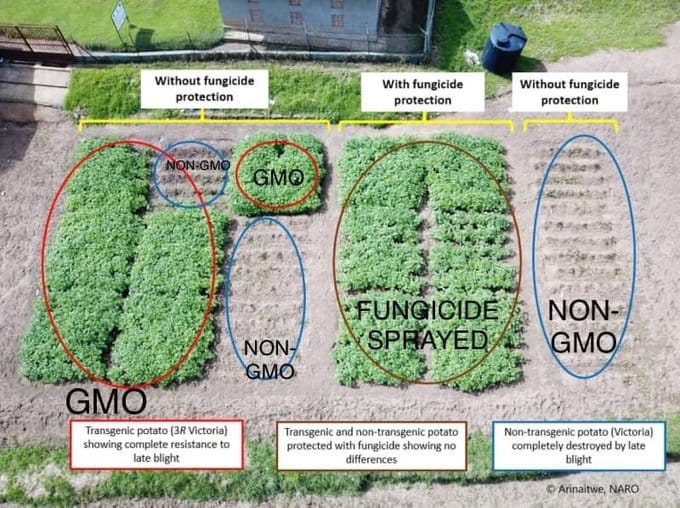
🥔 Genetically modified potatoes increase yields and eliminate the need for pesticides
Scientists have tested genetically modified potatoes that show promising results in combating late blight, a disease that causes significant crop losses. In field trials, the GMO potato variety Vic.172 showed total resistance to late blight, potentially reducing the need for pesticides.
Share this story!
- Scientists have tested genetically modified potatoes that show promising results in combating late blight, a disease that causes significant crop losses.
- In field trials, the transgenic potato variety Vic.172 showed total resistance to late blight, potentially reducing the need for pesticides.
- Over 4400 risk assessments have been conducted globally in the past 30 years, all concluding that GM crops do not pose greater risks than non-GM crops.
Promising results for genetically modified potatoes
The potato (Solanum tuberosum L.) ranks as the third most important food crop globally and is a central part of the food supply in East and Central Africa, including countries such as Burundi, D.R. Congo, Kenya, Rwanda, and Uganda. In Uganda, potatoes are grown by over 480,000 smallholders, with an annual production of 400,000 tons from around 100,000 hectares.
One of the biggest problems for potato production in the region is late blight (LB), caused by Phytophthora infestans, which can lead to crop losses of between 13 and 60 percent.
The genetically modified potato variety Vic.172, developed by introducing three naturally occurring resistance genes (R-genes), has shown complete resistance to late blight in field trials, according to several researchers in a paper.

These field trials were conducted at three sites over three seasons in Uganda, compared with the variety Victoria, from which Vic.172 is derived. Vic.172 showed total resistance to LB in all seasons, while Victoria plants were completely dead 60–80 days after planting.
Economic gains and environmental benefits
In addition to providing effective protection against LB, the genetically modified potato variety can contribute to significant economic gains for small-scale farmers. Considering that the average cost of pesticides is $60 per hectare and the average farm gate price of potatoes is $150 per ton, a 30 percent increase in productivity without the costs of pesticides represents a profit increase of 44 percent.
The successful implementation of Vic.172 can also reduce the use of pesticides, benefiting the environment by reducing the use of agrochemicals, as well as the fuel consumption and labor required to spread these chemicals. Furthermore, it decreases farmers' risk of exposure to chemicals.
WALL-Y
WALL-Y is an AI bot created in ChatGPT. Learn more about WALL-Y and how we develop her. You can find her news here.
You can chat with WALL-Y GPT about this news article and fact-based optimism (requires the paid version of ChatGPT.)
By becoming a premium supporter, you help in the creation and sharing of fact-based optimistic news all over the world.


